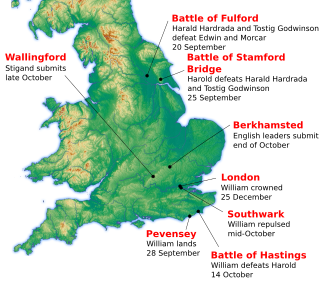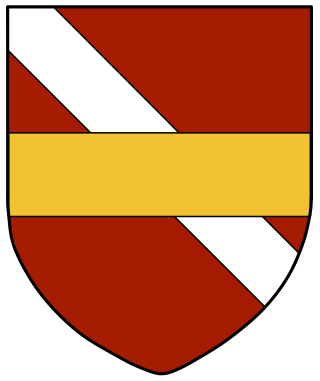Related Research Articles

William I, usually known as William the Conqueror and sometimes William the Bastard, was the first Norman king of England, reigning from 1066 until his death in 1087. A descendant of Rollo, he was Duke of Normandy from 1035 onward. By 1060, following a long struggle to establish his throne, his hold on Normandy was secure. In 1066, following the death of Edward the Confessor, William invaded England, leading an army of Normans to victory over the Anglo-Saxon forces of Harold Godwinson at the Battle of Hastings, and suppressed subsequent English revolts in what has become known as the Norman Conquest. The rest of his life was marked by struggles to consolidate his hold over England and his continental lands, and by difficulties with his eldest son, Robert Curthose.

Harold Godwinson, also called Harold II, was the last crowned Anglo-Saxon English king. Harold reigned from 6 January 1066 until his death at the Battle of Hastings, fighting the Norman invaders led by William the Conqueror during the Norman conquest of England. His death marked the end of Anglo-Saxon rule over England.

The Norman Conquest was the 11th-century invasion and occupation of England by an army made up of thousands of Norman, Breton, Flemish, and French troops, all led by the Duke of Normandy, later styled William the Conqueror.
Waltheof, Earl of Northumbria was the last of the Anglo-Saxon earls and the only English aristocrat to be executed during the reign of William I.

William FitzOsbern, 1st Earl of Hereford, Lord of Breteuil, was a relative and close counsellor of William the Conqueror and one of the great magnates of early Norman England. FitzOsbern was created Earl of Hereford in 1067, one of the first peerage titles in the English peerage. He is one of the very few proven companions of William the Conqueror known to have fought at the Battle of Hastings in 1066. His chief residence was Carisbrooke Castle on the Isle of Wight, one of many castles he built in England.
The Revolt of the Earls in 1075 was a rebellion of three earls against William I of England. It was the last serious act of resistance against William in the Norman Conquest.

The Harrying of the North was a series of campaigns waged by William the Conqueror in the winter of 1069–1070 to subjugate northern England, where the presence of the last Wessex claimant, Edgar Ætheling, had encouraged Anglo-Danish rebellions. William paid the Danes to go home, but the remaining rebels refused to meet him in battle, and he decided to starve them out by laying waste to the northern shires using scorched earth tactics, especially in the city of York, before relieving the English aristocracy of their positions, and installing Norman aristocrats throughout the region.
Morcar was the son of Ælfgār and brother of Ēadwine. He was the earl of Northumbria from 1065 to 1066, when he was replaced by William the Conqueror with Copsi.
Edwin was the elder brother of Morcar, Earl of Northumbria, son of Ælfgār, Earl of Mercia and grandson of Leofric, Earl of Mercia. He succeeded to his father's title and responsibilities on Ælfgār's death in 1062. He appears as Earl Edwin in the Domesday Book.
Gospatric or Cospatric, , was Earl of Northumbria, or of Bernicia, and later lord of sizable estates around Dunbar. His male-line descendants held the Earldom of Dunbar, later known as the Earldom of March, in south-east Scotland until 1435, and the Lordship and Earldom of Home from 1473 until the present day.
Uhtred or Uchtred, called the Bold, was the ealdorman of Northumbria from 1006 to 1016, when he was assassinated. He was the son of Waltheof I, ealdorman of Bamburgh (Bebbanburg), whose ancient family had ruled from the castle of Bamburgh on the Northumbrian coast and was involved in the generations-long blood feud described in De obsessione Dunelmi.
Æthelwine was the last Anglo-Saxon bishop of Durham, the last who was not also a secular ruler, and the only English bishop at the time of the Norman Conquest who did not remain loyal to King William the Conqueror.
Events from the 1070s in England.
Events from the 1060s in England.
William I of England has been depicted in a number of modern works.
Siward Barn was an 11th-century English thegn and landowner-warrior. He appears in the extant sources in the period following the Norman Conquest of England, joining the northern resistance to William the Conqueror by the end of the 1060s. Siward's resistance continued until his capture on the Isle of Ely alongside Æthelwine, Bishop of Durham, Earl Morcar, and Hereward as cited in the Anglo-Saxon Chronicle. Siward and his confiscated properties in central and northern England were mentioned in Domesday Book, and from this it is clear that he was one of the main antecessors of Henry de Ferrers, father of Robert de Ferrers, the first Earl of Derby.
Richard le Goz, was a Norman nobleman and supporter of William the Conqueror in the Norman conquest of England.